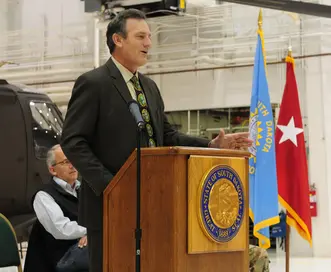In a dramatic turn of events, South Dakota has found itself in the national spotlight following a detailed examination of former Governor Kristi Noem’s credit card expenses. As the conversation unfolds, the intricacies of state expenditure, governance oversight, and the burden on taxpayers have come to the forefront, revealing the unique challenges South Dakota faces in governmental accountability.
The controversy surrounding Kristi Noem, who resigned as South Dakota Governor in January to take the role of U.S. Secretary of Homeland Security, has been ignited by a series of credit card expenses charged to the state. Over her six-year tenure, approximately $750,000 was billed to state-issued credit cards, raising questions about the ethical and fiscal management of state resources.

Kristi Noem
Expenses that have drawn scrutiny include international travels like a Canadian hunting trip, a book tour, and luxurious accommodations in hotels such as The Venetian in Las Vegas. These revelations have sparked a strong response from the legislative oversight committee, prompting them to question how the state authorizes and justifies such spending.
House Speaker nominee Jon Hansen and Lt. Governor Larry Rhoden were seen during Noem’s fiscal year 2026 budget address, highlighting the importance of accountability in state finances. Speaking on the matter, Sen. Taffy Howard of Rapid City expressed significant concerns over several expenses, most notably the $500 subscriptions for Sirius XM radio.

Larry Rhoden
“The taxpayers have an issue with that. I have an issue with that,” Howard remarked, emphasizing the responsibility legislators bear to institute clear parameters on spending. In response, the state has since canceled these subscriptions and implemented policy changes to better manage credit card usage.
Many of the charges were attributed to security details meant to protect the governor during travel, explained Jim Terwilliger, Commissioner of the Bureau of Finance and Management. However, the overlap between state duties and personal or political engagements has fueled a debate about the appropriateness of taxpayer-funded security, particularly when it pertains to campaign or out-of-state political events.
Security has always been a significant concern in South Dakota’s governance, with safety standards managed strictly by the state Highway Patrol. This has led to a separation of accounts to distinguish security-related expenses from other gubernatorial costs. Nonetheless, questions linger about the transparency and justification of these expenditures.
The State Auditor’s Office, led by Auditor Rich Sattgast, currently reviews these charges post-submission. Notably, this office has never denied a charge from the governor’s accounts, which has prompted calls for stricter legislative parameters to ensure enhanced oversight and possible restrictions on the spending of elected officials.
Senator Howard’s ongoing dissatisfaction with the official responses underscores a growing demand for more transparency and accountability from leaders in South Dakota. She asserts, “It’s our job as legislators to set up parameters. Your answer cannot always be hiding behind security all the time.”
The dialogue about these expenditures is crucial not only to South Dakota’s fiscal health but also to trust in leadership. It remains clear that South Dakota, with its rich history and proud people, must navigate these fiscal challenges to secure a future that prioritizes integrity and efficiency in governance.
The legacy of this debate will likely influence future legislation and the possible implementation of more stringent financial oversight—a development South Dakotans will be keenly observing as it unfolds.